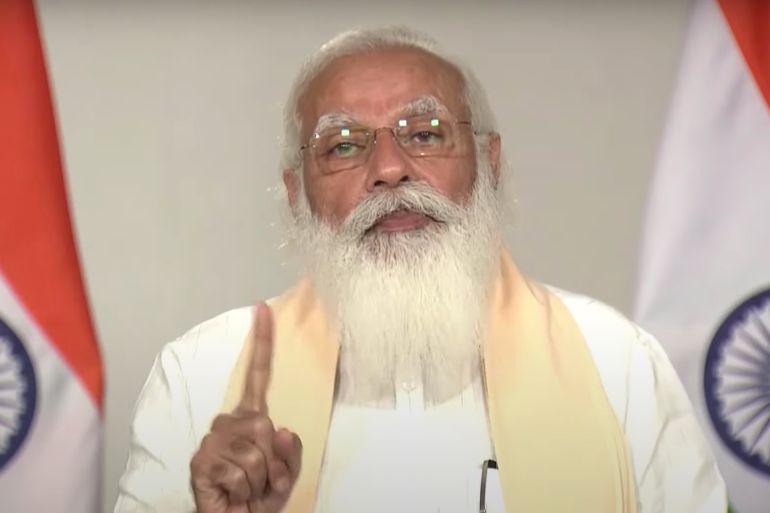Modi warns of coronavirus ‘storm’ overwhelming India
Prime Minister Narendra Modi says authorities are racing to boost oxygen supplies as Delhi authorities warn of impending shortage.

Indian Prime Minister Narendra Modi has said the country faces a coronavirus “storm” overwhelming its health system, as authorities in New Delhi said the Indian capital’s hospitals would start running out of medical oxygen by Wednesday.
Modi said the federal government was working with local authorities nationwide to ensure adequate supplies of hospital beds, oxygen and anti-viral drugs to combat a huge second wave of the COVID-19 pandemic.
Keep reading
list of 4 itemsCan India control record-breaking COVID-19 infections?
In Pictures: Deaths and desperation in Delhi as COVID cases rise
49 passengers on India-Hong Kong flight test positive for COVID
“The situation was manageable until a few weeks ago. The second wave of infections has come like a storm,” he said in a televised address, urging citizens to stay indoors and not panic amid India’s worst health emergency in memory.
“The central and state governments, as well as the private sector, are together trying to ensure oxygen supplies to those in need. We are trying to increase oxygen production and supply across the country.”
India is currently recording more new cases of coronavirus than any other country. As of Monday, the seven-day average for new daily infections was about 233,000, according to Our World in Data.
The country reported its highest daily death toll on Tuesday, with large parts of the country now under lockdown amid a fast-rising second surge of contagion.
The health ministry said 1,761 people had died in the past day, raising India’s toll to 180,530 – still well below the 567,538 reported in the United States, though experts believe India’s actual toll far exceeds the official count.
Lockdowns ‘last option’
In his address to the nation, Modi urged state governments to use lockdowns as the last resort to contain the spread of the second wave of COVID-19 infections, even as cases and deaths surge to record highs.
“We have to save the country from a lockdown. I appeal to the states, they should use lockdown as the last option, and pay more attention to micro-containment zones,” Modi said in an address concerning the coronavirus situation in the country.
Lockdowns have been enacted across the country as infections surge in India, including in Delhi, where a week-long lockdown was imposed from Monday night to try to contain the virus and provide relief to over-stretched hospitals.
Manish Sisodia, the deputy chief minister of Delhi, said that major government hospitals in the city of 20 million people had between eight and 24 hours worth of oxygen while some private ones had enough for just four to five hours.
“If we don’t get enough supplies by tomorrow morning, it will be a disaster,” he told news agency Reuters, calling for urgent help from the federal government.
Addressing the nation on the COVID-19 situation. https://t.co/rmIUo0gkbm
— Narendra Modi (@narendramodi) April 20, 2021
Modi also asked citizens to stay indoors, not spread panic about the virus and form local groups to ensure adherence to COVID-19 protocols.
The 70-year-old Modi asked state governments to urge migrant workers to stay put and that “assurance from the states that they will soon be vaccinated wherever they are currently residing will help them a lot”.
In recent days the prime minister has faced a backlash on social media over his response to surging coronavirus cases, with people criticising his decision to address tens of thousands of people at state election rallies and allowing Hindu devotees to congregate for a festival.
British Prime Minister Boris Johnson cancelled his delayed trip to the South Asian nation, his first major foreign visit since taking power in 2019, due to rising cases.
On Tuesday, the health ministry reported 259,170 new infections nationwide – a sixth day over 200,000 and getting closer to the peak of nearly 300,000 seen in the United States in January.
Total coronavirus cases in India are now at 15.32 million, second only to the United States, with epidemiologists saying more infectious new variants of the virus were one of the main factors behind the latest surge in cases.